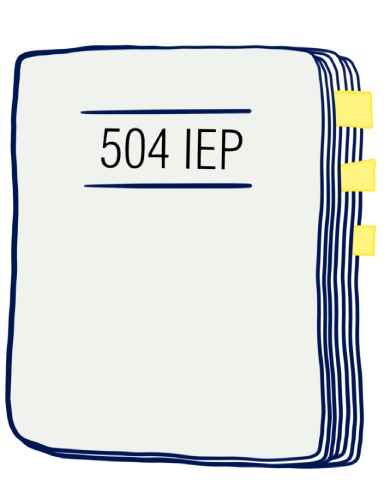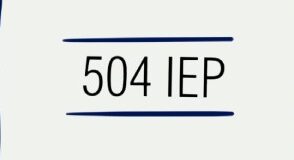
Recently, the topic of disability support has dominated conversation among Roosevelt High School’s IEP and 504 community, those who have been denied an IEP or 504 Plan, and those who are still in the process of getting one or the other.
Although a student’s official accommodations and modifications are agreed upon between a student’s family and the school, it’s ultimately up to the teachers to provide and follow through with them.
Three anonymously interviewed subjects share their experience with a learning disability in an educational environment. More specifically, they cite experiences with teachers who do not respect the agreed upon 504s, and even IEPs.
One student with a 504 Plan shares, “Well, a lot of times it does depend on the teacher who actually implements it … But not a ton of teachers actually follow it. So when you find the teachers who follow it, it’s like [angelic choir singing].”
Furthermore, another student says only the “nice teachers” respect and support their 504 plan. This student is currently working to get an IEP so that teachers would be “legally obligated” to follow through on their accommodations, which they add are badly needed. Although 504s do legally promise accommodations, the student says that teachers tend to respect IEPs and provide accommodations promised through them more often.
They went on to explain that with many of their accommodations being rarely delivered upon, their family went to an outside resource for support, an executive functions coach. They point out how they only had that type of professional support because their family could afford it, and how others without those same resources are left in the dark when the school falls short.
Students also share how frustrating and difficult the process of getting an IEP or 504 Plan can be. More specifically, they feel the school denied them an IEP or 504 Plan because in the past they had done fine without them.
When a 504 request is submitted, the Student Intervention Team (SIT) is responsible for addressing the accommodations request from a holistic perspective. The SIT is a group of counselors, school psychologists, nurses, school administrators, and intervention specialists on the Roosevelt staff, as explained by Frank Heffernan, Roosevelt counselor and 504 Building Coordinator.
“The [SIT] looks at all the information and decides whether or not they believe a 504 is appropriate for this student at this time. We try to look at the whole picture of the student,” Heffernan explains.
Some students feel that their high grades may inhibit their 504 request, and Heffernan acknowledges that a student’s grades may serve as a data point for SIT in the context of a student’s 504 request. “Some people feel like, yes, we acknowledge that you maybe have ADHD and we know you’re working hard and we know you’re putting in massive amounts of time to keep up, but you’re getting 3.8 [GPA], and so, you have found a way to sort of self accommodate. And, maybe we decide that given your abilities and your performance, even though you are having some struggles and we don’t deny that, it’s just that a 504 may not be appropriate.”
A student shares their own experience learning with a disability, “You have to start 100 feet back from the starting line, [while] most students are at the starting line. And then people who are neurodivergent, like ADHD, dyslexia, all these people have disabilities, we have to also have fireman gear, and we have to, we’re already so far behind. And we’re expected to keep up with everybody else, supposed to be at the same place, but it’s not fair.”
Accommodations are provided on the basis of a select type of predetermined disorder and the individual students’ respective needs, and many students’ 504s assist both their academic and health needs. “That’s probably the most important part of the process,” says an anonymous student, “And also making sure that I have my medicines and like emergency shots, medicines, [and] what not in supply in the nurse’s office.”
The first step in improving self-advocacy, the student shared, is being aware of your own needs, and making them clear to the school. However, other students share that when they applied for IEPs, the school denied them because they’d done well academically in the past without accommodations. One student, who wishes to remain anonymous as well, explains that she only got her IEP when her grades had begun to slip. “It took me actually having a hard time for them to actually look. The way I word it is they let me struggle,” she shares.
For those who have been able to figure out this process though, many of their thoughts are of what comes next, and for some, that’s college. One student adds, “I realize, I have to slowly phase into taking this over as my priority, and learning that in the future, not everyone’s going to be able to follow through on all your needs, so getting used to … being treated normally, like in a workplace because being seen equal to others, where it’s like being seen below others, because you have these medical conditions that limit you [which] can put you at a disadvantage.”

There is a silver lining, however. Many colleges work to make accessible accommodations a reality. Bree Callahan, University of Washington’s ADA Coordinator, shares that in place of a plan such as an IEP and 504, colleges including the UW have letters of accommodation which serve as an agreement between the student and school of what services or accommodations they need to succeed, much like an IEP.
Callahan goes on to explain the process with an example, “Student Bree comes into the UW and says I have a disability or have a health condition that’s impacting me and access, and I need ‘x’. What is possible to remove this barrier?” Callahan continues, “And then the higher education, well, they create their own access plan. So we don’t call them an IEP, or a 504 plan, like the K-12 has that structure. We [then] have what we call an access planning meeting. And then we create a Letter of Accommodation that goes to academic departments.”
Callahan compares the accommodations, explaining that a K-12 plan might provide a change such as reducing the length of a paper or essay. In college, instead the goal is to provide resources to help that student clear that obstacle, such as having a textbook read aloud, or even having a deadline extended so the assignment can be completed to the fullest of the student’s ability.
Callahan closes with the sentiment that in college, and even life beyond highschool, students are now adults, and as an adult it’s necessary to take responsibility. She likens the experience to a transition from being a backseat passenger to the driver of a taxi. “You have to know how to read the roads and the signs or the signs of the road, understand how to drive, how to fix your flat tire, you own the car, you’re driving the car. You have to take all the ownership as well.”
Dealing with the bureaucracy of the disability accommodations system also affects the parents and guardians of such students. One of these parents, who requested anonymity, has two children with disabilities, both have 504s and one has an IEP. This parent had to quit her job to manage the process of acquiring IEP and 504 Plans for their children. She also reflected on the system’s disparities, describing the current state of school support as “the educational lottery,” in which kids have to hope to have an accommodated education at school.
This idea was further represented by a student, who also requested to remain anonymous, “When it’s like that, it gives off the impression that I’m stupid, that we [neurodivergent kids] are stupid. That we’re not good at school, because we’re so far behind. But in reality, I think I’m pretty smart. I am smart. But the school system kind of makes me feel like I’m not. Because I don’t have access to have the same experience as the rest of the people in my class. A public school is supposed to provide equal opportunity for all students. And without accommodations for people like me, we don’t get that same opportunity. We don’t get the chance to learn in a good and efficient way.”



